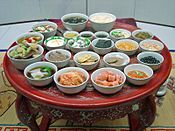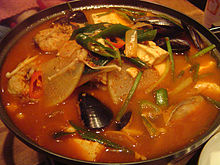- Jjigae
-
Jjigae 
Dubu jjigae (Korean tofu stew)Korean name Hangul 찌개 Revised Romanization jjigae McCune–Reischauer tchigae Jjigae (Korean pronunciation: [tɕ͈iɡɛ]) is a Korean dish similar to a Western stew. There are many different varieties but it is typically made with meat, seafood or vegetables in a broth seasoned with gochujang, doenjang, ganjang or saeujeot.[1] Jjigae is typically served in a communal dish and boiling hot.
A Korean meal almost always includes either a jjigae or a guk (국, soup). In the Joseon Dynasty jjigae was called by the ancient name jochi and two varieties would always be present on the King's surasang.[2]
The different types of jjigae are typically called according to their principal ingredients such as saengseon jjigae (생선찌개) made from fish or dubu jjigae (두부찌개) made from tofu, or according to their broth and seasonings like gochujang jjigae (고추장찌개) or doenjang jjigae (된장찌개).
Contents
Varieties
By ingredient
- Altang jjigae (알탕찌개), made with pollock roe
- Dubu jjigae (두부찌개), made with firm tofu
- Ge jjigae (게찌개), made with crab
- Kimchi jjigae (김치찌개), made with kimchi and other ingredients.
- Kongbiji jjigae (콩비지 찌게), made with soybeans
- Budae jjigae (부대찌개), made with a spicy broth and assorted meats and other ingredients.
- Myeongranjeot jjigae (명란젓찌개), made with myeongran jeot (salted fermented roe)
- Saengseon jjigae (생선찌개), made with fish. Dongtae jjigae (동태찌개) is a variety made from frozen pollack.
- Sundubu jjigae (순두부찌개), made with uncurdled soft tofu
By condiment
- Doenjang jjigae (된장찌개), made with a doenjang broth.
- Cheonggukjang jjigae (청국장찌개), made with cheonggukjang and other ingredients.
- Saeujeot jjigae (새우젓찌개), made with saeujeot
- Gochujang jjigae (고추장찌개), made with "gochujang" broth, usually also including pork.
See also
References
External links
- Selection of jjigae recipes with photos

This article is part of a series on Korean cuisine
한국 요리AncillariesBeveragesOtherKimchi Field Museum • Kimchi refrigerator • List of Korean dishes • List of Korean beverages • Korean royal court cuisine Korea portalCategories:
Korea portalCategories:- Korean soups and stews
Wikimedia Foundation. 2010.

